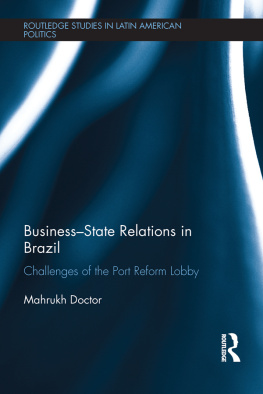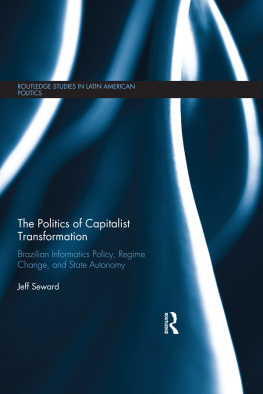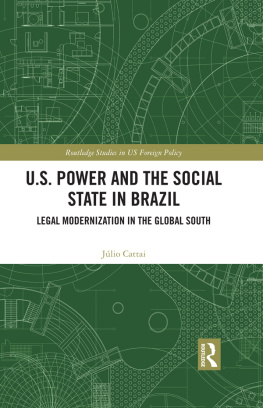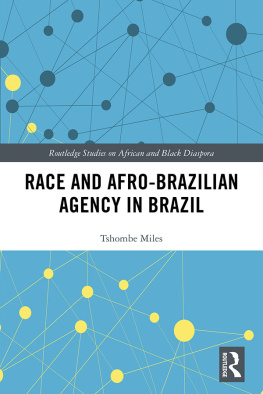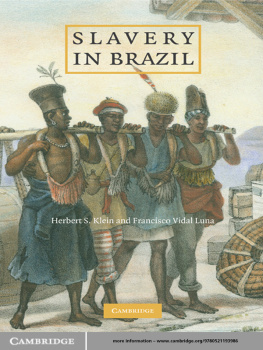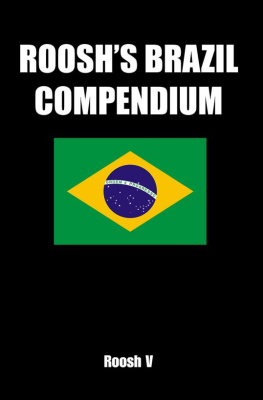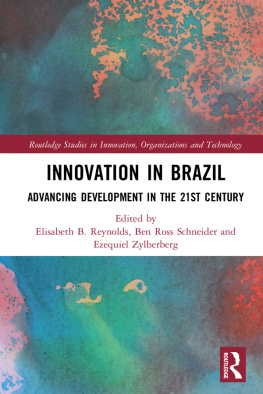BusinessState Relations in Brazil
In recent years, the spotlight of international attention on Brazil has often been in the area of logistics infrastructure for example, on its capacity to deal with the high demand expected during the World Cup and the Olympics. However, neither competitiveness nor infrastructure concerns are new for Brazil. In the 1990s, Brazilian policymakers adopted a series of liberalising economic reforms that exposed the poor condition of logistics infrastructure and inadequate investment in Brazilian ports, roads, railways and airports. Over twenty years later, the implications of those reforms still colour Brazils prospects for development.
Mahrukh Doctors book evaluates the political economy of reform in Brazil and the difficulty of implementing institutional modernisation in the context of opposition from vested interests originating in the state and civil society. It focuses specifically on the Port Modernisation Law, which aimed to augment the countrys competitiveness by creating efficient and low-cost ports. Based on primary research carried out over a period of twenty years using original qualitative data, Doctors analysis focuses on the difficulties in implementing this law and how those difficulties are symptomatic of the wider issues associated with lack of sufficient investment in infrastructure in Brazil. Using the case of the business lobby for port reform, the book examines the evolving nature of businessstate relations and the process of institutional change in Brazil. Doctor particularly examines the building of consensus for reform and policy formulation in the port sector and the challenges of reform implementation and institutional modernisation. The analysis provides extensive insights and lessons related to the prospects for boosting competitiveness of Brazilian ports. The book concludes by suggesting a likely path for the evolution of corporatist institutions as well as the provision of adequate logistics infrastructure to support business success in Brazil.
A unique work on the subject of port reform in Latin America that uses a hybrid analytical framework to understand reform in Brazil, this book is pertinent for a variety of subjects from Latin American Studies to political economy to economic policymaking.
Mahrukh Doctor is Senior Lecturer in Political Economy at the University of Hull and Adjunct Professorial Lecturer at the Johns Hopkins University SAIS-Europe. Her research interests include political economy of Brazil and regionalism in Latin America.
Routledge Studies in Latin American Politics
Representation and Effectiveness in Latin American Democracies
Congress, Judiciary and Civil Society
Edited by Moira B. MacKinnon and Ludovico Feoli
Lula, the Workers Party and the Governability Dilemma in Brazil
Hernn F. Gmez Bruera
Transnational Activism and National Movements in Latin America
Bridging the Divide
Edited by Eduardo Silva
Democracy, Revolution and Geopolitics in Latin America
Venezuela and the International Politics of Discontent
Edited by Luis Fernando Angosto-Ferrndez
Transforming Brazil
A History of National Development in the Postwar Era
Rafael R. Ioris
Pharmaceutical Autonomy and Public Health in Latin America
State, Society, and Industry in Brazils AIDS Program
Matthew Flynn
Civil-Military Relations in Post-Conflict Societies
Transforming the Role of the Military in Central America
Orlando J. Prez
Re-Imagining Community and Civil Society
In Latin America and the Caribbean
Edited by Gordana Yovanovich and Roberta Rice
Revolutionary Violence and the New Left
Transnational Perspectives
Edited by Alberto Martn lvarez and Eduardo Rey Tristn
BusinessState Relations in Brazil
Challenges of the Port Reform Lobby
Mahrukh Doctor
The Politics of Capitalist Transformation
Brazilian Informatics Policy, Regime Change, and State Autonomy
Jeffrey G. Seward

